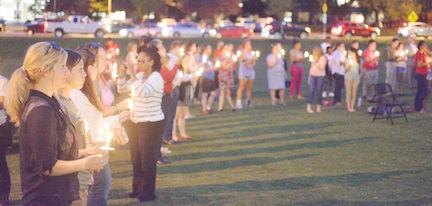Editor’s note: The Technician originally reported that last year, 10 NC State students died as a result of suicide. This information is incorrect and was incorrectly attributed to Karen Miller, Program Coordinator of the Suicide Prevention Program. In addition, we reported that Student Health delivers on-campus QPR training. This is incorrect, as it is the NC State Counseling Center that does so.
About 120 students gathered at Harris Field to recognize the World Suicide Prevention Day for the fourth consecutive year Wednesday evening.
Several students and faculty members shared stories about their personal experiences dealing with suicide. Bob Kochersberger, associate professor of English, spoke about his son, Charlie, who suffered from heroin addiction and later took his own life. Kochersberger reminisced about when his son first came to him and his wife to talk about his addiction.
The struggle the Kochersberger family experienced dealing with the death of their son is shared with countless families across the globe.
Every 40 seconds a person dies by suicide somewhere in the world, according to the World Health Organization. At four-year colleges, suicide is the leading cause of death for students.
Susan Addams, the vigil’s emcee and chaplain for the Suicide Prevention Program, said suicide does not discriminate against gender, race, ethnicity or faith, and anyone can be a victim of suicide.
The National Alliance of Mental Illness (NAMI) is a leading sponsor of the vigil. Avi Aggarwal, president of the NC State chapter of NAMI and a junior in chemical engineering, also spoke at the event.
“We want to both remember those who have been lost to suicide and prevent future losses by promoting awareness of the issue, dispelling myths and stigma about suicide and mental illness and encouraging students to get help and/or become trained in suicide prevention,” Aggarwal said.
Other organizations that helped to sponsor the vigil were the GLBT center, the NC State Counseling Center, CHASS Dept. of Social Work, Dept. of Student and Community Standards and the NC State University Suicide Prevention Program.
Adam Ward, who represented the GLBT Center and is a graduate student in comparative biomedical sciences, said the GLBT community is at an especially high risk for attempting suicide if faced with family rejection.
To help spread awareness, Addams urged students to become educated about the warning signs of suicide and the programs available for those in need and those wanting to help.
The Question Persuade Refer program offered at the NC State Counseling Center gives students the opportunity to “learn the warning signs, know how to instill hope, and where to get help,” said Karen Miller, the Program Coordinator of the Suicide Prevention Program at NC State. The QPR program is a 90-minute program free to students, staff and faculty who wish to become gatekeepers.
Including RAs, RDs, TAs, mentor groups and student leaders, Miller said more than 1,600 people have been trained by QPR through NC State in less than two years.
HopeLine, Inc. is another available tool for those who are thinking about attempting suicide. Those at the hotline are there to offer support and listen to what callers have to say.
“The reason we have the vigil each year on World Suicide Prevention Day is to remember loved ones, show support for suicide prevention and help stop the stigma associated with suicide,” Miller said. “It’s so important to hold events such as these because they help raise awareness about prevention resources on campus and in the community.”
The Counseling Center is continuing to honor Suicide Awareness Month is helping to eradicate the stigma surrounding suicide by hosting “What’s Your Story,” a part of Stop the Stigma at the Brickyard on both Thursday and Friday from 11 a.m. to 1 p.m.








